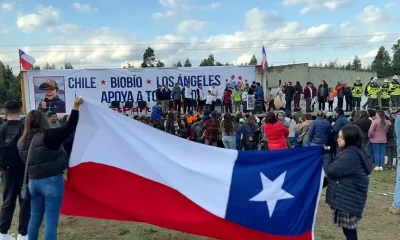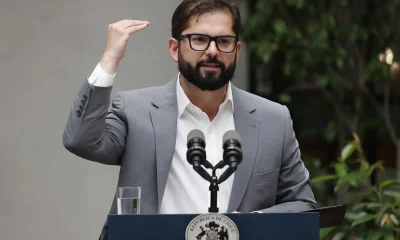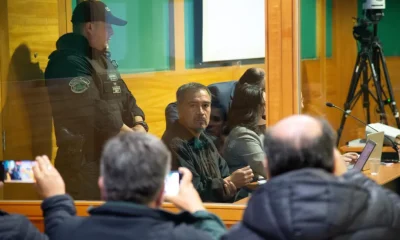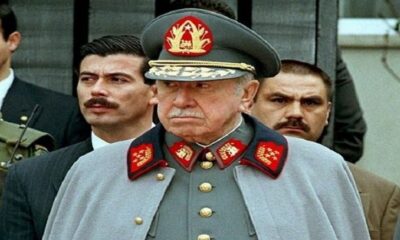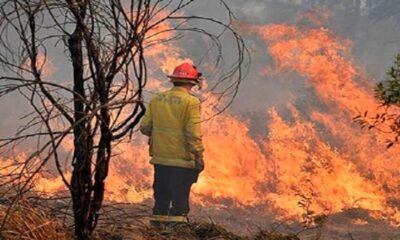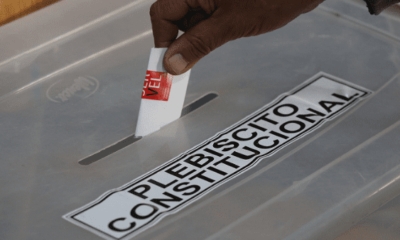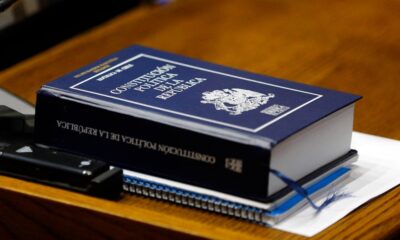International
The mother who decided to walk 1,300 kilometers in Chile to get an expensive medicine and save her son from a serious illness
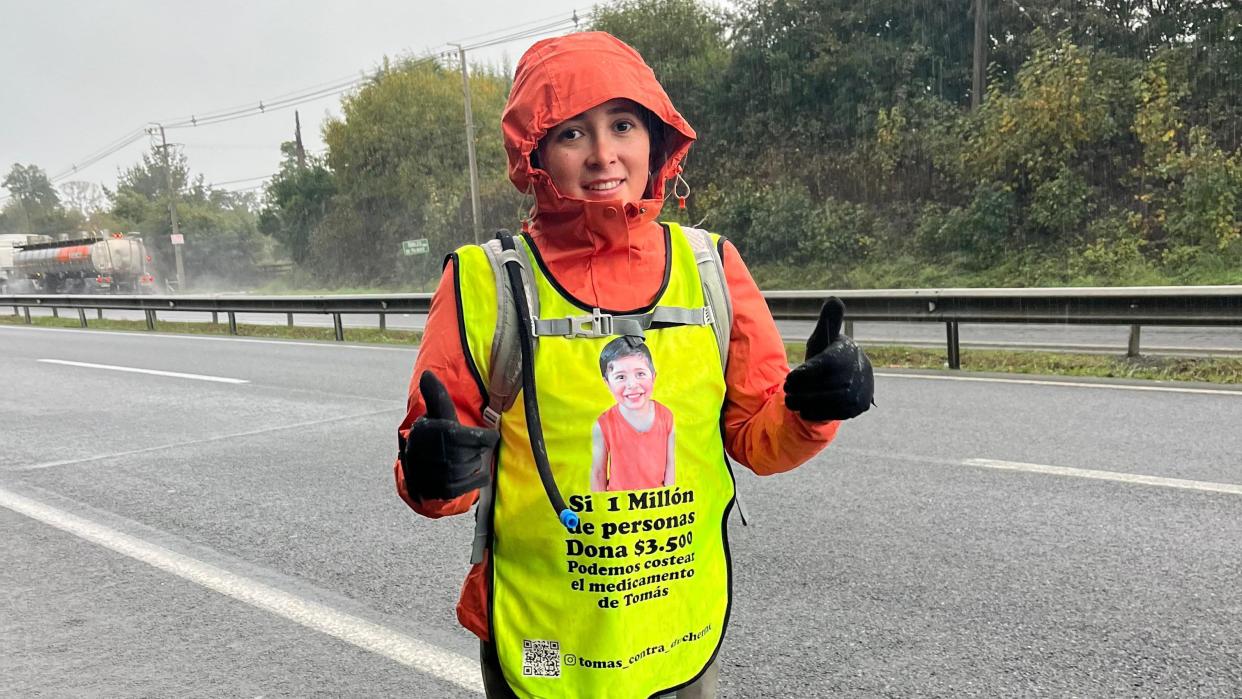
Walking the more than 1,300 kilometers that separate the commune of Ancud in Chiloé from the Palacio de la Moneda in Santiago in Chile may seem like a chimera to many.
Not so for the Chilean Camila Gómez, a mother who completes this challenge with the goal of raising 3.5 billion pesos (US$3.7 million) to buy a vital medicine for her five-year-old son and make visible the cause of patients with rare diseases in Chile.
Time is pressing. His son, Tomás Ross, suffers from Duchenne muscular dystrophy, a severe ailment that worsens quickly. If you do not receive the drug as soon as possible, it will be difficult to stop the disease.
“It is a very expensive medicine and a disease that in Chile has no opportunities, but there are opportunities abroad,” Gómez tells BBC Mundo.
Thousands of Chileans turned to Gómez’s case, whose determination went viral in the country.
The mother left Ancud on April 28 with Marcos Reyes, president of the Duchenne Families corporation in Chile, who also has two teenage children with the disease.
It was precisely Reyes who suggested the idea of the walk to Gómez.
“We walk for all the children and families who suffer from the disease. Time is running out,” Gómez said in an interview with the 24-hour national news.
The goal, in addition to raising funds and making their causes visible, is to get Chilean President Gabriel Boric to “bring a bill to Congress” that allows to improve the coverage of rare diseases in the country, as Reyes explains to BBC Mundo.
“He was born healthy, without any problem or complication, until at the age of four we realized that he had difficulty climbing stairs and performing some types of physical activity,” Gómez said on social networks.
“Until that moment there was no cure, but for a few months we have had a hope; in the United States the first drug was approved whose objective is to stop the progression of the disease,” Gómez continued.
This drug is marketed as elevidys and is administered intravenously in patients who, like Ross, are between four and five years old.
There are several types of muscular dystrophy, although Duchenne is the most common form and also one of the most severe.
The disease is unleashed due to a defective gene that results in the absence of dystrophin, a protein that helps keep the body’s cells intact.
Patients can develop problems when walking and running, fatigue, learning difficulties and cardiac and respiratory deficiencies due to the weakening of vital muscles in these functions.
The British national health services indicate that it normally affects young children and that people with this ailment usually live until they are 20 or 30 years old.
Gómez talks to BBC Mundo this Sunday, May 12, in “a little pause, while eating a little.”
It has already been more than two weeks of a journey that has about half left.
At the time of speaking, he is at the Púa toll booth, in the Araucanía Region, still more than 600 kilometers from the capital.
“This journey is crazy, but we think it’s turning out more than imagined,” says Gómez.
The first week was hard, but the mother says that with the passing of the days everything is getting easier.
“It’s impressive how the body adapts to the rhythm and it’s not so terrible anymore,” he says.
He is also helped by the emotional impulse he received by surprise last Friday, May 10 on the occasion of Mother’s Day.
Her son Tomás found her in the city of Temuco, accompanied by her father Alex Ross, to give her a hug, a bouquet of flowers and a recharge of encouragement.
“The boy knows that his mother gathers talks to find him a remedy, but he was only there for a while and turned to Chiloé. Because of the disease he has, he shouldn’t be cold,” Alex Ross tells BBC Mundo.
By May 10, the family had managed to raise more than half of the funds.
Gómez documents his tour on his social media accounts, where he receives thousands of messages of support, hundreds of thousands of views in his videos, the attention of the press and the company of other walkers who join in some sections of his tour.
“This has grown so much that I must help with the whole logistical issue: I look for accommodation, food, I assist them on the route with dry clothes, I look for podiatrists, kinesiologists and medicines,” says Alex Ross.
Camila Gómez and Marcos Reyes expect to arrive in La Moneda at the end of May, depending on the weather conditions.
A long way to make its causes visible that goes beyond the more than 1,300 kilometers that they will have traveled at the end of their journey.
International
Football Fan Killed in Clashes After Colombian League Match

Fans of Cúcuta Deportivo and their traditional rivals Atlético Bucaramanga clashed outside the stadium following their local league match on Tuesday, leaving one supporter dead and several others injured.
The deceased fan was stabbed, according to a senior police official in Cúcuta who confirmed the cause of death in a video statement. Local media reported that the victim was a supporter of the visiting team, Atlético Bucaramanga.
The match ended in a 2-2 draw. Authorities had banned the entry of Atlético Bucaramanga’s organized supporters into the stadium in an effort to prevent disturbances.
Despite the restrictions, violence broke out in the surrounding areas after the game. Among the injured were three police officers, an institutional source told AFP.
The incident adds to a series of recent violent episodes linked to Colombian football. The most recent occurred in December, when supporters of Atlético Nacional and Independiente Medellín clashed in the stands and on the pitch, leaving 59 people injured.
International
Missing Spanish Sailor Rescued After 11 Days Adrift in Mediterranean

The man had departed from the port of Gandía, on Spain’s eastern coast, with the intention of reaching the southern Spanish town of Guardamar del Segura, a journey of about 150 kilometers, a spokesperson for Spain’s maritime rescue service told AFP.
Search boats and aircraft were deployed on January 17, but the operation was called off on January 22 after efforts proved unsuccessful. Alerts were then issued to vessels navigating the area in case they spotted any signs of the missing sailor.
As hopes were fading, a surveillance aircraft from the European Union’s border agency Frontex spotted the sailboat on Tuesday, along with a person signaling for help, approximately 53 nautical miles northeast of Bejaia, Algeria.
A nearby vessel, the Singapore-flagged bulk carrier Thor Confidence, carried out the rescue and is expected to bring the man to an end to his ordeal when it arrives on Thursday in the southern Spanish port city of Algeciras.
Maritime rescue services shared images on social media showing a small white sailboat drifting at sea and secured alongside the much larger ship.
It remains unclear how the sailboat ended up hundreds of kilometers off its intended route or how the man managed to survive for so long alone in open waters.
International
Rubio Says U.S. Could Participate in Follow-Up Russia-Ukraine Talks

The United States could join a new round of talks this week aimed at ending Russia’s invasion of Ukraine, Secretary of State Marco Rubio said on Tuesday.
Teams from Kyiv and Moscow met last Friday and Saturday in Abu Dhabi in their first publicly acknowledged direct negotiations to discuss the peace initiative promoted by former U.S. President Donald Trump.
“They are going to hold follow-up talks again this week,” Rubio told the Senate Foreign Relations Committee. “There could be U.S. participation.”
However, Rubio suggested that Washington’s role may be more limited than during last week’s discussions, which included Steve Witkoff, the president’s special envoy, and Jared Kushner, Trump’s son-in-law.
The secretary of state indicated that progress may have already been made on security guarantees for Ukraine, one of Kyiv’s key demands in any agreement with Moscow after nearly four years of Russian invasion.
“There is one remaining issue that everyone is familiar with, and that is the territorial claim over Donetsk,” Rubio said, referring to the eastern Ukrainian region that Russia wants Ukraine to cede.
“I know that active efforts are underway to see whether the positions of both sides on this issue can be reconciled. It remains a bridge we have not yet crossed,” he added during the hearing.
Rubio acknowledged that the territorial question would be particularly difficult for Ukraine to resolve.
-

 Central America2 days ago
Central America2 days agoGuatemala seizes over a ton of cocaine hidden in flour at Pacific port
-

 International5 days ago
International5 days agoTrump-Era Defense Plan Prioritizes Border Security and Scales Back Global Commitments
-

 International5 days ago
International5 days agoBogotá and Quito Seek Dialogue After Tariffs and Power Cut Escalate Tensions
-

 International4 days ago
International4 days agoDelcy Rodríguez seeks political agreements after Maduro’s ouster
-

 International2 days ago
International2 days agoHistoric snowstorm paralyzes Toronto after 60 centimeters of snow
-

 International2 days ago
International2 days agoSpain’s irregular migrant population rises to 840,000, study finds
-

 International4 days ago
International4 days agoFederal immigration agents kill man in Minneapolis, sparking protests and outrage
-

 Central America1 day ago
Central America1 day agoGuatemala Police Arrest Prison Guard Caught in the Act of Extortion
-

 Central America1 day ago
Central America1 day agoHonduras swears in conservative president Asfura after disputed election
-

 Central America1 day ago
Central America1 day agoBukele leads public trust rankings as UCA survey highlights gains in security
-

 Sin categoría1 day ago
Sin categoría1 day agoEight Killed in Series of Armed Attacks in Ecuador’s Manabí Province
-

 International1 day ago
International1 day agoDoomsday clock moves to 85 seconds before midnight amid rising global risks
-

 International1 day ago
International1 day agoWinter Storm Fern Leaves 30 Dead and Over One Million Without Power Across the U.S.
-

 International2 days ago
International2 days agoRights group says nearly 6,000 killed in Iran protest crackdown
-

 International1 day ago
International1 day agoSpain approves plan to regularize up to 500,000 migrants in Historic Shift
-

 Sin categoría1 day ago
Sin categoría1 day agoEl Salvador Launches Fourth Year of Ocean Mission to Protect Marine Ecosystems
-

 International2 days ago
International2 days agoVenezuela frees at least 80 political prisoners, NGO says
-

 International2 days ago
International2 days agoEU launches new probe into X over AI-generated fake nude images
-

 International6 hours ago
International6 hours agoRubio Says U.S. Could Participate in Follow-Up Russia-Ukraine Talks
-

 International6 hours ago
International6 hours agoMissing Spanish Sailor Rescued After 11 Days Adrift in Mediterranean
-

 International6 hours ago
International6 hours agoFootball Fan Killed in Clashes After Colombian League Match
-

 Central America6 hours ago
Central America6 hours agoGuatemala President Says Starlink Terminal Found Inside Prison
-

 International2 days ago
International2 days agoSevere winter storm grips U.S., leaves multiple dead as extreme cold persists
-

 International2 days ago
International2 days agoFrance debates ban on social media for children under 15



























